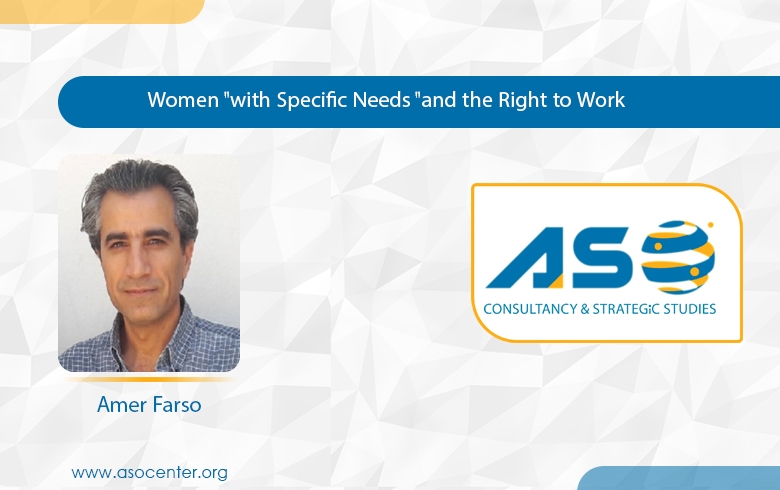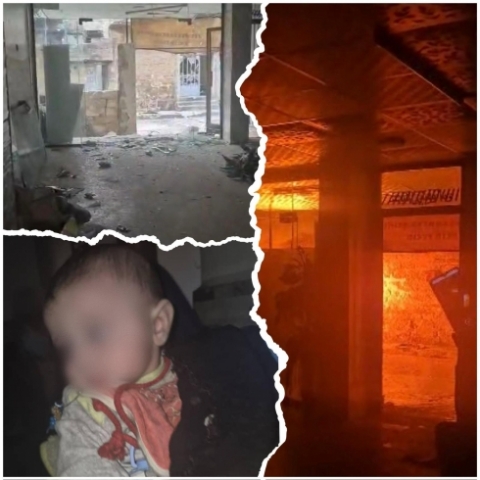

Women "with Specific Needs "and the Right to Work
2020-01-26
Writer: Amer Farso
In the current decade, especially in light of Self-Administration announced in 2014 in NES, women have achieved significant and important success, in terms of obtaining their rights to work, participating in political decision-making, and their effective contribution in most areas of civil-social life, as well as their participation to a great extent in military field, through legitimate defense concept and Internal Security Forces Institution. However, have all women obtained those rights? It is certain that illiterate and elderly women and women with specific needs have not been given their rights, especially in light of wars and crisis, where they get subjected to the utmost levels of persecution, exclusion and marginalization. Because of the imbalance and defect in the body's function and its structure, it is not possible for disabled women to carry out or participate in all work fields like other women. Therefore, their finical income is almost non-existent due to the lack of employment opportunities commensurate with their capabilities, which results in high levels of poverty and unemployment among them. This, as a result, is reflected in the degree of their acceptance within their families, where they are represented as a serious burden on them, not to mention the difficulty of integrating those women into a bigger community, where they are met with rejection and lack of cooperation, which makes them feel being insulted and this increases their sense of isolation and detachment of society.
How can the suffering of this group of women in society be reduced, to ensure their right to a decent life, and to provide them with job opportunities that are appropriate with their particular conditions, as well as to avoid the negative effects that are reflected on society due to marginalizing women? And which authority has the responsibility for achieving this?
Despite the ongoing conflict's status in the region, the Self-Administration was able to construct institutions and bodies that commensurate in its characteristics with the emergency situation or with real-life conditions. Nevertheless, it did not address issues related to some groups that urgently need care and attention, and it relied mainly on civil society organizations, which in turn allocated only some empowerment projects for this category of people because most of the CSOs working in women's care and support field have tended towards supporting households headed by women with no disabilities, aiming to re-start their income-generating activities, by empowering them cognitively through training workshops to increase their access to economic resources and establish women's projects through livelihoods programs. Furthermore, those organizations contributed, but to a lesser extent, to their access to decision-making power to make decisions with the favor of themselves and their families.
In this sense, it can be said that the orientations of Self-Administration and the civil society organizations' activities regarding women's right to work did not differ greatly from each other in terms of not addressing that importance for "women with special needs" in their agendas and plans to alleviate their suffering, as the role of Self-Administration was limited only to providing some support and care for them, through the Labor and Social Affairs Authority. However, it has not been able yet to establish an appropriate mechanism to provide them with job opportunities, for example, through creating a special economic support fund for that group of women, and by granting them financial loans to implement sustainable projects, which in return, will provide them with financial income, preserve their dignity, reduce the burden on their families and, by doing so, integrate them into society.
Hence, it should be noted that CSOs have sought to find similar solutions, such as livelihood projects for this group of women, but with negligible percentages, or a clear societal impact, regardless of whether there are some success stories that have not changed the situation's reality.
When will then the Self-Administration enact a set of laws for those with specific needs, in all fields? especially in what helps them to facilitate mobility, by modifying old buildings, and requiring modern facilities and buildings to take into account the needs of this category in mobility, and determine their presence rates in public jobs Commensurate with their abilities. In addition to creating an economic support fund for them, and granting the necessary facilities for civil society organizations' work in developing plans and programs to address care, alleviate their suffering and preserve their right to a decent life?



